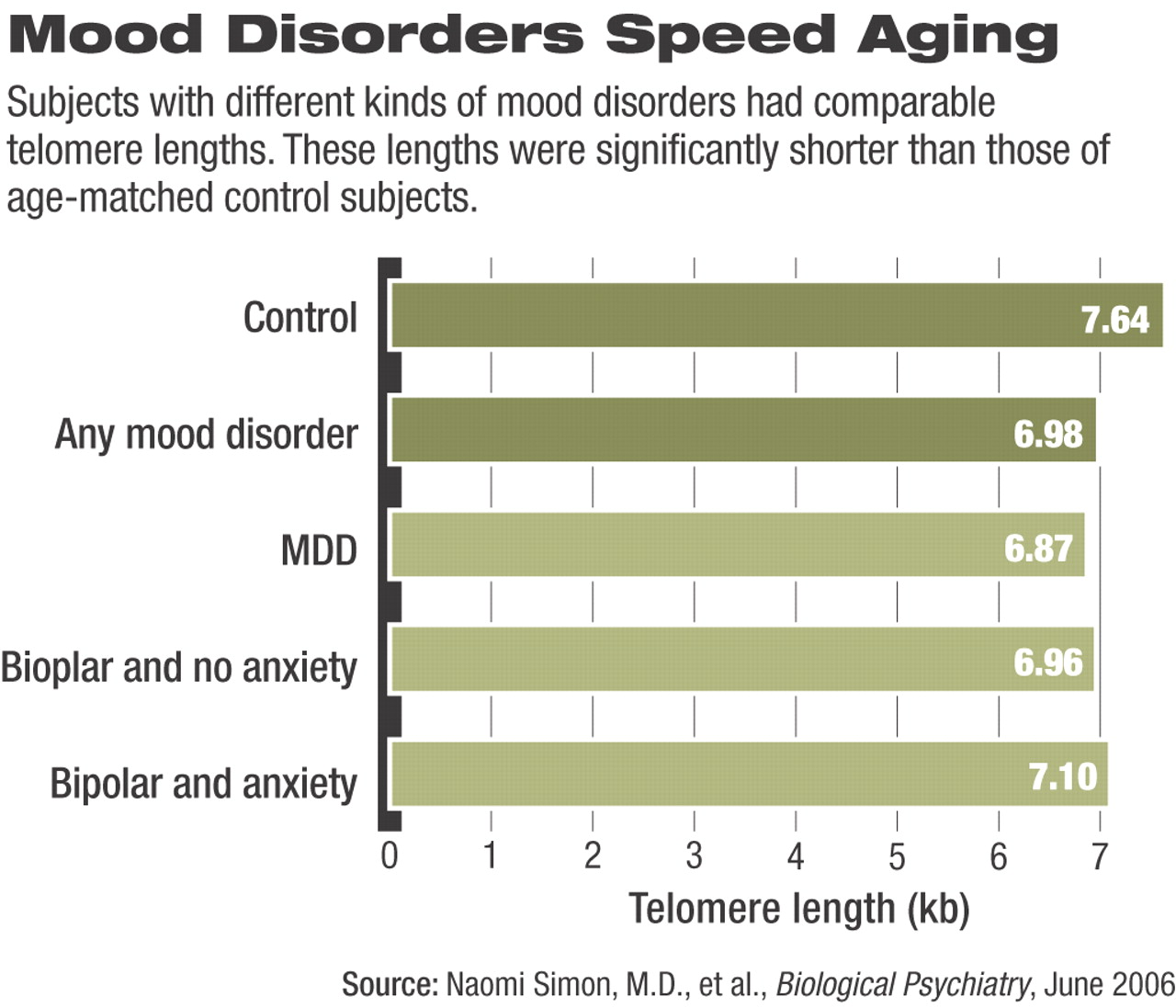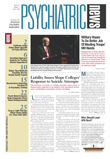In 1965 cell biologists reported a thought-provoking discovery—the older a person, the fewer times his or her cells divide when cultured in the lab.
In 1990, cell biologists reported something even more interesting—each time a human cell divides in lab culture, the length of the telomeres (DNA-protein complexes) capping the ends of its chromosomes shortens a bit, until the point at which the telomeres become so short that the cell is unable to divide further. The cell then dies.
Thus, cell aging appears to be related to the normal chronological aging process and under the control of telomeres. Telomere shortening might be viewed as a cell clock that ultimately controls the number of cell divisions and cell life span.
But the story doesn't stop there. Enter psychiatry....
In 2004 Elissa Epel, Ph.D., an assistant professor of psychiatry at the University of California, San Francisco, and colleagues reported that women psychologically stressed by caring for a chronically ill child had shorter telomeres than did same-aged women without such a burden. So psychological stress may well hasten the normal telomere shortening process, Epel and her group concluded (Psychiatric News, January 7, 2005).
And now Naomi Simon, M.D., associate director of Massachusetts General Hospital's Center for Anxiety and Traumatic Stress Disorders, and coworkers have found in a pilot study that individuals with mood disorders have shorter telomeres than do healthy control subjects. Their findings are in press with Biological Psychiatry.
Simon and her colleagues suspected that the psychological stress associated with mood disorders might accelerate cell aging. They decided to assess whether individuals with mood disorders have abnormally short telomeres, a hallmark of hastened cell aging. They recruited 88 subjects, 44 of whom had one or more DSM-IV mood disorders (15 had major depressive disorder, 14 bipolar disorder, and 15 bipolar disorder plus anxiety).
The other 44 were age-, gender-, and ethnicity-matched mentally healthy controls. White blood cells were taken from each subject and assessed for telomere length.
Telomeres on the Fast Track
Telomere length for the three groups with a mood disorder was virtually the same, the researchers found. However, when the telomere lengths of all three groups were combined and compared with the telomere length of the control group, the former were significantly shorter (see chart).
In fact, individuals with mood disorders were found to have such truncated telomeres that they represented 10 years or more of accelerated aging, the researchers calculated.
“The finding of shorter telomere length in patients with mood disorders compared with controls, potentially representing 10 years or more of accelerated aging, was what we expected,” Simon told Psychiatric News. “However, we also expected to see even greater relative telomere shortening in individuals with both a mood disorder plus an anxiety disorder; we did not find this, but it may be due to the limitations of this initial pilot study.”
Despite possible limitations, “Our study is the first to demonstrate accelerated telomere shortening in mood disorders, or in any chronic psychiatric disorder,” Simon and colleagues wrote, “and suggests that chronic mood disorders contribute to acceleration of aging processes.”
Finding Confirms Suspected Link
“The current findings by Simon and colleagues extend our finding linking perceptions of life stress to telomere shortening, to the realm of psychiatric disorders, mainly depression,” Epel told Psychiatric News. “This is a solid study that demonstrates the finding that many in the field have long suspected—that depression is pro-aging.”
The results also suggest that if depression, or the psychological stress it imposes, can truly hasten telomere shortening, then that accelerated shortening might make people prematurely susceptible to medical diseases that tend to occur as people grow older. Indeed, there is evidence pointing in that direction.
For example, Epel and her group recently found that in healthy young and middle-aged subjects, a significant link exists between elevated levels of stress hormones and shorter telomere length. In another investigation, middle-aged subjects who had had heart attacks were found to possess telomeres that were significantly shorter than those of healthy control subjects.
Similar results emerged from another study of subjects (average age 61) with type II diabetes. Accelerated telomere attrition has even been linked to increased rates of cancer in experimental animals.
Finally, if future studies can confirm that mood-disorder-provoked telomere shortening can indeed trigger medical diseases, then it might also reveal novel pathways for treating or preventing these diseases, Simon and her group suggested.
The current study was funded by the National Institute of Mental Health, National Institute on Aging, Massachusetts General Hospital, and the Flight Attendant Medical Research Institute. Simon and her team have received funding from the National Alliance for Research on Schizophrenia and Depression to study telomere length further in subjects who have either bipolar disorder or bipolar disorder plus an anxiety disorder.
An abstract of “Telomere Shortening and Mood Disorders: Preliminary Support for a Chronic Stress Model of Accelerated Aging” can be accessed from<www.journals.elsevierhealth.com/periodicals/bps/home>.▪

